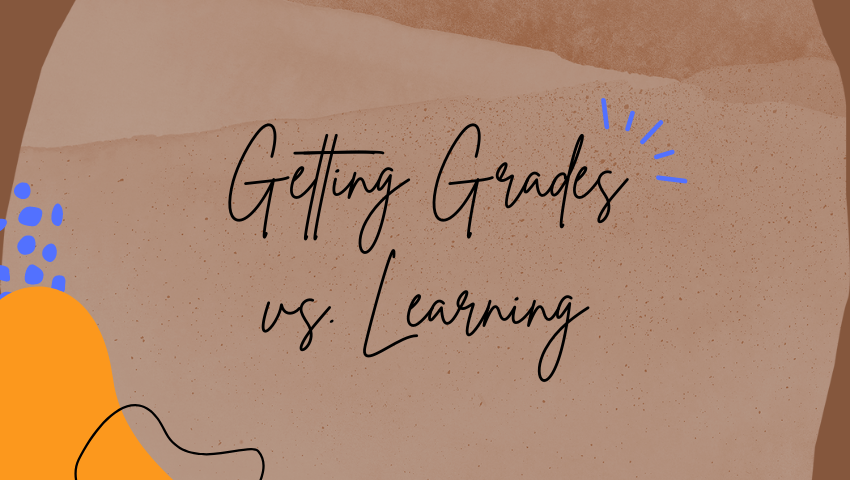Have you ever said something seemingly straightforward (to you at least), only to watch as your innocent comments generate untold levels of controversy and drama?
Well a little while back I wrote a short post on some poor study habits over at Lifehack.org, and even though it got a bunch of shares on social media, something odd was happening in the comments.
According to some of the commenters, I had got it wrong. School is NOT about short-cuts to getting good grades.
School is about LEARNING silly.
Those “study hacks” you’re talking about might work in your unsophisticated engineering courses, where all you care about is getting the right answer, but can hardly be generalized to other subjects.
And what, are you just telling me I can get away with not studying at all!?
As you can probably tell, I’m being a bit facetious here, but I think the haters who commented here (most of which hardly look like students btw) have brought to light a critical point that I want to address:
Is school (and college more specifically) all about getting grades, or is it about learning? Becoming well rounded? Getting an EDUCATION?
Is college about learning about the high-brow wonders of Neitsche and the French Revolution? Becoming an educated member of society?
Or was Mark Twain right when he said:
I’ve never let my schooling interfere with my education.
Let’s dig in a little here.
Getting Grades: Do grades matter?
What do we mean when we’re saying “getting grades” or “focusing on right or wrong answers”?
Well part of the reason for attending college and going through a degree program (and many times most of the reason for engineers, premed students, etc.), is to receive some sort of accreditation: proof that you know something about a certain body of knowledge.
So you holding your diploma in your hand is not just a photo-op moment with you proud parents marking a transition into the next phase of your life, it’s also the moment you become recognized for having learned the fundamentals of, say, Civil Engineering.
Now you can take that diploma home, slap B.S. Civil Engineering on your resume, and go in search of a real-life bridge-building engineering position at URS Corp., or HDR, or AECOM (civil firms sure do love their acronyms).
You’ve proven yourself to the occupational world.
And that’s the benefit that a university can provide, and also why they can demand such high tuition rates.
So how do we know you know what you claim you know?
That’s right… some sort of evaluation. Some metric of performance. A grade on a test perhaps? Or maybe even a grade point average…
My point here is this: in order to enjoy the benefit of getting that job at Boeing you always dreamed of, or to apply to Harvard Medical School, you have to, in every sense of the phrase “get grades” in order to do it.
So if you’re going to college with something like that as your end-goal, focusing on getting the right answers and scoring well on exams is an absolute must.
And in most technical degree programs, there is a definitive body of knowledge, whether in Engineering, Math, Chemistry, Biology, that you need to master, which does have a set of “right” answers as currently agreed upon by the worldwide science community.
Learning: What do we mean by that anyway?
Okay. With that out of the way, let’s move on to the “learning” aspect we’re talking about.
What I think most people (parents, professors, commenters on my Lifehack post) are talking about here is the idea of becoming an “educated” member of society. Working towards a higher-level human-interest-driven pinnacle of intellectual achievement. Being cultured. Being able to speak intelligently about politics, philosophy, and civil rights.
First off, is this really something we want to strive for? Or has the “education” we’re searching for been co-opted by academic community?
General consensus: not sure about that whole “being cultured” thing, but being a well rounded person is a must.
It means you can relate to people. You’re socially fluent. You can logically navigate real-world human problems, not just manipulate numbers and design variables.
So yes, “being educated” is something we should strive for, and learning about history and philosophy and psychology is definitely part of that.
But should this be our main focus of our time dedicated towards our degree program? Should this even need to occur at a university?
As you can probably guess at this point, my answer is a resounding “no.”
Now don’t mistake me here, “learning” and becoming “educated” is one of the most important parts of being a human being: not only for your future career, but as a vehicle to fully experience life.
The thing is, we do this naturally – and I don’t agree that college is the best medium to fulfill this essential life skill.
Case in point: if you’ve had the joy of taking English 101 or history at this point in your college journey, how many of you were excited to go to those courses (certainly not me)?
And not only that, how many of you actually remember and can connect with the information covered? (uhhh… something about British people going to war?).
This is not because these subjects aren’t inherently interesting, it’s because this “learning” is occurring in the wrong medium.
Yes, of course, if you want to be an intellectual or an academic, it’s probably right for you. But for most of us the real “learning” happens outside of the classroom.
Reading diverse and interesting books.
Exploring side projects.
Spending hours and hours on the internet reading about whether the Large Hadron Collider would in fact create a black hole, effectively ending Earth, and what the experience of falling into a black hole would be like…
And most importantly, experiencing work and projects in the real world. Working for local companies, and landing internships, co-ops, and undergrad research positions on campus. That’s where the real learning occurs that’s going to prepare you for life past graduation.
So my conclusion is this: Grades should be the primary focus.
There is a right way to do it that will lead to long-term retention of the core material, and there is a wrong way to do it (cramming, memorizing, regurgitating notes, etc.), which can create short-term grade success, but will leave you wondering what the hell an integral is.
If you get your grades first and foremost, and do it efficiently, then there will be an abundance of time for you to explore reading, side projects, research opportunities, clubs, sports, co-ops and internships, etc., etc., etc…
For you to “learn” in the truest sense of the word (which also by no means stops when you exit college if you do it right).
So follow Mark Twain’s lead: get your “schooling” taken care of, and you’ll have plenty of time to get your “education.”
Alright… time for you to weigh in.
I’m sure I’m not the only one here with an opinion. I wanna hear what >you think.
Do grades matter? Or it is pure learning we’re after?
Or is this just a false dichotomy in and reality we’re arguing about nothing??


